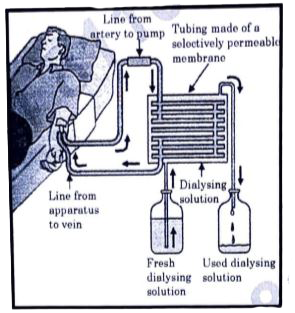The figure shown below represents a common type of dialysis called as Haemodialysis. It removes waste products from the blood. Such as excess salts, and urea which are insufficiently removed by the kidney in patients with kidney failure. During the procedure, the patient's blood is cleaned by filtration through a series of semi-permeable membranes before being returned to the blood of the patient. On the basis of this, answer the following questions:

Which one of the following is not a function of Artificial Kidney?
To remove nitrogenous wastes from the blood.
To remove excess fluids from the blood.
To reabsorb essential nutrients from the blood.
To filter and purify the blood.
Step by step video & image solution for The figure shown below represents a common type of dialysis called as Haemodialysis. It removes waste products from the blood. Such as excess salts, and urea which are insufficiently removed by the kidney in patients with kidney failure. During the procedure, the patient's blood is cleaned by filtration through a series of semi-permeable membranes before being returned to the blood of the patient. On the basis of this, answer the following questions: Which one of the following is not a function of Artificial Kidney? by Biology experts to help you in doubts & scoring excellent marks in Class 10 exams.
Updated on:21/07/2023Topper's Solved these Questions
- QUESTION PAPER 2022 TERM1BOOK - X BOARDSCHAPTER - QUESTION PAPER 2022 TERM1EXERCISE - Section -B
6 Videos
- QUESTION PAPER 2022 TERM 2 SET 3BOOK - X BOARDSCHAPTER - QUESTION PAPER 2022 TERM 2 SET 3EXERCISE - SECTION C
4 Videos
- QUESTION PAPER 2023BOOK - X BOARDSCHAPTER - QUESTION PAPER 2023EXERCISE - Question
24 Videos
Similar Questions
Knowledge Check
Blood dialysis is called :
AArtificial lungBArtificial kidneyCArtificial heartDArtificial brainOrnithine cycle removes two waste products from blood in liver
AUrea and carbon dioxideBCarbon dioxide and ammoniaCAmmonia and uric acidDAmmonia and ureaWhich of the following carries blood from the heart to the kidneys?
ARenal arteryBCoronary arteryCVena cavaDRenal vein
Which of the following carries blood from the heart to the kidneys?
View SolutionWhich of the following is used artificially to remove nitrogenous waste products from the blood?
View SolutionThe kidneys not only remove the waste products from the blood but also play a very important role in maintaining
View SolutionThe kidneys not only remove the waste products from the blood but also play a very important role in maintaining
View SolutionWhich of the following substances are removed from blood in the kidneys?
View Solution
